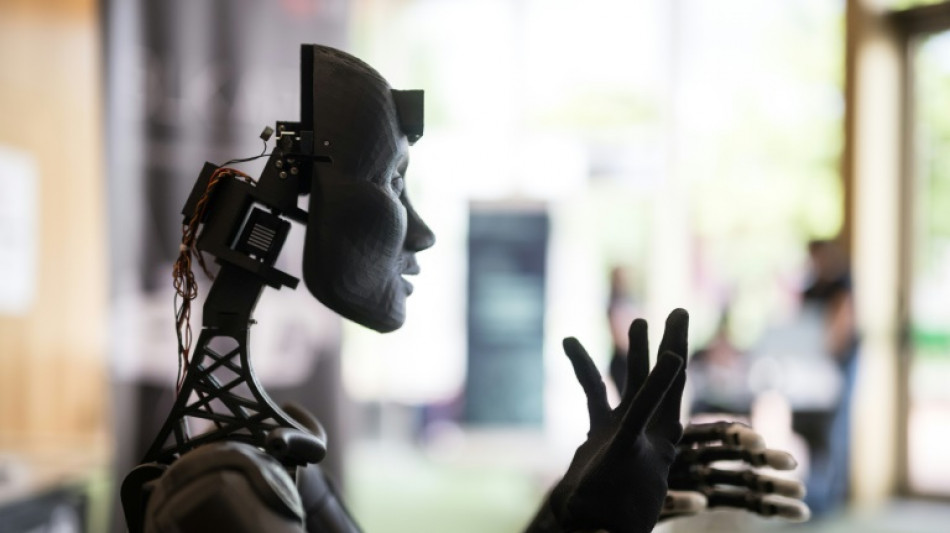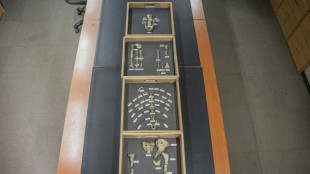
-
 Breyten Breytenbach, writer who challenged apartheid, dies at 85
Breyten Breytenbach, writer who challenged apartheid, dies at 85
-
Truce called after 82 killed in Pakistan sectarian clashes

-
 Salah wants Liverpool to pile on misery for Man City after sinking Saints
Salah wants Liverpool to pile on misery for Man City after sinking Saints
-
Berrettini takes Italy to brink of Davis Cup defence

-
 Lille condemn Sampaoli to defeat on Rennes debut
Lille condemn Sampaoli to defeat on Rennes debut
-
Leicester sack manager Steve Cooper

-
 Salah sends Liverpool eight points clear after Southampton scare
Salah sends Liverpool eight points clear after Southampton scare
-
Key Trump pick calls for end to escalation in Ukraine

-
 Tuipulotu try helps Scotland end Australia's bid for a Grand Slam
Tuipulotu try helps Scotland end Australia's bid for a Grand Slam
-
Davis Cup organisers hit back at critics of Nadal retirement ceremony

-
 Noel in a 'league of his own' as he wins Gurgl slalom
Noel in a 'league of his own' as he wins Gurgl slalom
-
A dip or deeper decline? Guardiola seeks response to Man City slump

-
 Germany goes nuts for viral pistachio chocolate
Germany goes nuts for viral pistachio chocolate
-
EU urges immediate halt to Israel-Hezbollah war

-
 Basel votes to stump up bucks to host Eurovision
Basel votes to stump up bucks to host Eurovision
-
Ukraine shows fragments of new Russian missile after 'Oreshnik' strike

-
 Six face trial in Paris for blackmailing Paul Pogba
Six face trial in Paris for blackmailing Paul Pogba
-
Olympic champion An wins China crown in style

-
 It's party time for Las Vegas victor Russell on 'dream weekend'
It's party time for Las Vegas victor Russell on 'dream weekend'
-
Norris applauds 'deserved' champion Verstappen

-
 Kohli blasts century as India declare against Australia
Kohli blasts century as India declare against Australia
-
Verstappen 'never thought' he'd win four world titles

-
 Former Masters champion Reed wins Hong Kong Open
Former Masters champion Reed wins Hong Kong Open
-
Awesome foursomes: Formula One's exclusive club of four-time world champions

-
 Smylie beats 'idol' Cameron Smith to win Australian PGA Championship
Smylie beats 'idol' Cameron Smith to win Australian PGA Championship
-
Five key races in Max Verstappen's 2024 title season

-
 Max Verstappen: Young, gifted and single-minded four-time F1 champion
Max Verstappen: Young, gifted and single-minded four-time F1 champion
-
'Star is born': From homeless to Test hero for India's Jaiswal

-
 Verstappen wins fourth consecutive Formula One world title
Verstappen wins fourth consecutive Formula One world title
-
Survivors, sniffing dogs join anti-mine march at Cambodia's Angkor Wat

-
 Far right eye breakthrough in Romania presidential vote
Far right eye breakthrough in Romania presidential vote
-
Jaiswal slams majestic 161 but Australia fight back in Perth

-
 Edinburgh's alternative tour guides show 'more real' side of city
Edinburgh's alternative tour guides show 'more real' side of city
-
IPL teams set to splash the cash at 'mega-auction' in Saudi Arabia

-
 Olympics in India a 'dream' facing many hurdles
Olympics in India a 'dream' facing many hurdles
-
Wounded Bangladesh protesters receive robotic helping hand

-
 Majestic Jaiswal 141 not out as India pile pain on Australia
Majestic Jaiswal 141 not out as India pile pain on Australia
-
Giannis, Lillard lead Bucks over Hornets as Spurs beat Warriors

-
 Juan Mata agent slammed as 'cowardly' by angry A-League coach
Juan Mata agent slammed as 'cowardly' by angry A-League coach
-
Marta inspires Orlando Pride to NWSL title

-
 Palestinian pottery sees revival in war-ravaged Gaza
Palestinian pottery sees revival in war-ravaged Gaza
-
Main points of the $300 billion climate deal

-
 Robertson wants policy change for overseas-based All Blacks
Robertson wants policy change for overseas-based All Blacks
-
Israel retreat helps rescuers heal from October 7 attack

-
 Afghan women turn to entrepreneurship under Taliban
Afghan women turn to entrepreneurship under Taliban
-
Mounting economic costs of India's killer smog

-
 At climate talks, painstaking diplomacy and then anger
At climate talks, painstaking diplomacy and then anger
-
Uruguayans head to polls with left hoping for comeback

-
 Trump's mass deportation plan could end up hurting economic growth
Trump's mass deportation plan could end up hurting economic growth
-
Iran director in exile says 'bittersweet' to rep Germany at Oscars


Will AI one day win a Nobel Prize?
Artificial intelligence is already disrupting industries from banking and finance to film and journalism, and scientists are investigating how AI might revolutionise their field -- or even win a Nobel Prize.
In 2021, Japanese scientist Hiroaki Kitano proposed what he dubbed the "Nobel Turing Challenge", inviting researchers to create an "AI scientist" capable of autonomously carrying out research worthy of a Nobel Prize by 2050.
Some scientists are already hard at work seeking to create an AI colleague worthy of a Nobel, with this year's laureates to be announced between October 7 and 14.
And in fact, there are around 100 "robot scientists" already, according to Ross King, a professor of machine intelligence at Chalmers University in Sweden.
In 2009, King published a paper in which he and a group of colleagues presented "Robot Scientist Adam" -- the first machine to make scientific discoveries independently.
"We built a robot which discovered new science on its own, generated novel scientific ideas and tested them and confirmed that they were correct," King told AFP.
The robot was set up to form hypotheses autonomously, and then design experiments to test these out.
It would even program laboratory robots to carry out those experiments, before learning from the process and repeating.
- 'Not trivial' -
"Adam" was tasked with exploring the inner workings of yeast and discovered "functions of genes" that were previously unknown in the organism.
In the paper, the robot scientist's creators noted that while the discoveries were "modest" they were "not trivial" either.
Later, a second robot scientist -- named "Eve" -- was set up to study drug candidates for malaria and other tropical diseases.
According to King, robot scientists already have several advantages over your average human scientist.
"It costs less money to do the science, they work 24/7," he explained, adding that they are also more diligent at recording every detail of the process.
At the same time, King conceded that AI is far from being anywhere close to a Nobel-worthy scientist.
For that, they would need to be "much more intelligent" and able to "understand the bigger picture".
- 'Nowhere near' -
Inga Strumke, an associate professor at the Norwegian University of Science and Technology, said that for the time being the scientific profession is safe.
"The scientific tradition is nowhere near being taken over by machines anytime soon," she told AFP.
However, Strumke added that "doesn't mean that it's impossible", adding that it's "definitely" clear that AI is having and will have an impact on how science is conducted.
One example of how it is already in use is AlphaFold -- an AI model developed by Google DeepMind -- which is used to predict the three-dimensional structure of proteins based on their amino acid.
"We knew that there was some relation between the amino acids and the final three-dimensional shape of the proteins... and then we could use machine learning to find it," Strumke said.
She explained that the complexity of such calculations was too daunting for humans.
"We kind of have a machine that did something that no humans could do," she said.
At the same time, for Strumke, the case of AlphaFold also demonstrates one of the weaknesses of current AI models such as so-called neural networks.
They are very adept at crunching massive amounts of information and coming up with an answer, but not very good at explaining why that answer is correct.
So while the over 200 million protein structures predicted by AlphaFold are "extremely useful", they "don't teach us anything about microbiology", Strumke said.
- Aided by AI -
For her, science seeks to understand the universe and is not merely about "making the correct guess".
Still, the groundbreaking work done by AlphaFold has led to pundits putting the minds behind it as front-runners for a Nobel Prize.
Google DeepMind's director John Jumper and CEO and co-founder Demis Hassabis were already honoured with the prestigious Lasker Award in 2023.
Analytics group Clarivate, which keeps an eye on potential Nobel science laureates, places the pair among the top picks for the 2024 candidates for the Prize in Chemistry, announced on October 9.
David Pendlebury, head of the research group, admits that while a 2021 paper by Jumper and Hassabis has been cited thousands of times, it would be out of character for the Nobel jury to award work so quickly after publication -- as most discoveries that are honoured date back decades.
At the same time, he feels confident that it won't be too long before research aided by AI will win the most coveted of science prizes.
"I'm sure that within the next decade there will be Nobel Prizes that are somehow assisted by computation and computation these days is more and more AI," Pendlebury told AFP.
F.Cardoso--PC



